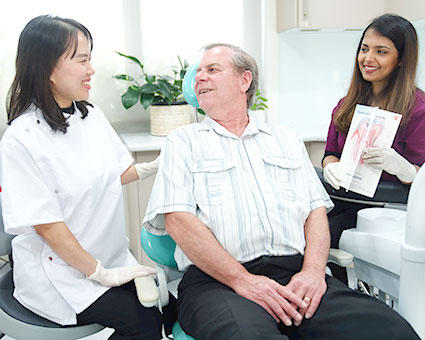
Root Canal Therapy in Burwood
Root canal therapy, also known as endodontic treatment, is used to repair damage inside the tooth. Your dentist drills a hole into the tooth, removes the soft centre, known as the dental pulp. The pulp is made up of connective tissue, nerves and blood supply, and extends into the roots of the tooth. After the pulp is removed, the space is filled and sealed.
The surface of the tooth used for chewing, known as the crown, may also be replaced if necessary. Your dentist or an endodontist may perform the procedure.
At Burwood Dental Centre, our dentists are extensively trained in endodontics to provide pain-free treatment for you, and ensure your experience is as comfortable as possible.
Do I Need This Therapy?
Root canal therapy is often necessary to save a badly infected or damaged tooth. The tooth may have become infected or damaged by decay, repeated dental work, wear and tear, gum disease, cracked fillings, or an injury to the tooth. Our goal is to save your tooth from extraction.
If you experience-
- Severe toothache or sensitivity when biting or chewing
- Sensitivity to hot and cold, which lasts longer than a few seconds
- Swelling of your face or gum near the infected tooth
- A tooth that’s changing colour and becoming grey or black
- A tooth with deep decay
- A fracture in the tooth
- Swollen and tender gums
- Pus around an infected tooth
- A bitter taste in the mouth
- A loose tooth
What to Expect

- Check-up and X-rays: During your first appointment, the dentist takes an X-ray of the tooth to see the shape of the canals and determine whether there is any infection in the bone around the tooth. They might also prescribe you some medication to reduce the inflammation in your tooth.
- Removal of decay and clearing the infection: On the next visit, the procedure begins with the application of a local anaesthetic to numb the surrounding tissues. A rubber sheet, called a dam, is placed over the tooth to prevent contamination; your breathing is not affected. Then, the dentist will drill a hole in the infected tooth to remove the decay and infected nerves.
- Disinfecting and shaping the canals: Each tooth has 1-4 canals, depending on the tooth. All the canals are cleaned, shaped, and disinfected. Depending on the spread of decay, it may take several appointments for the dentist to clean and shape the hole inside the tooth before placing a sterile filling inside. Between visits, the tooth is sealed with a temporary filling, and a metal band may be placed around the tooth to protect it.
- Filling the canals: When the canals are rid of infection, the dentist fills the canal space with a rubber-like substance called gutta percha. It functions as a permanent bandage, and stops any type of fluid or bacteria from seeping in through the roots.
- Capping the tooth: too much dental work on the tooth weakens it. It may be necessary to insert a small support into the canals to strengthen the tooth. You may also need to cap the tooth with an artificial crown.
Root canal therapy can be more uncomfortable than a normal filling, because it takes longer, but it is often no more painful. Delaying the procedure may increase your pain, and infection may become more severe and extensive. Irreversible bone and gum damage may result, leaving no alternative other than to extract a tooth that might have been saved.
What Does It Cost?
The average cost for this therapy (without the crown) is $1,500. Depending on the type and level of cover you have for your dental insurance, a claim may be made for part of your treatment from your provider.
Contact Us Today
Make an appointment with us at Burwood Dental Centre to get a quote on your root canal treatment.
CONTACT US

